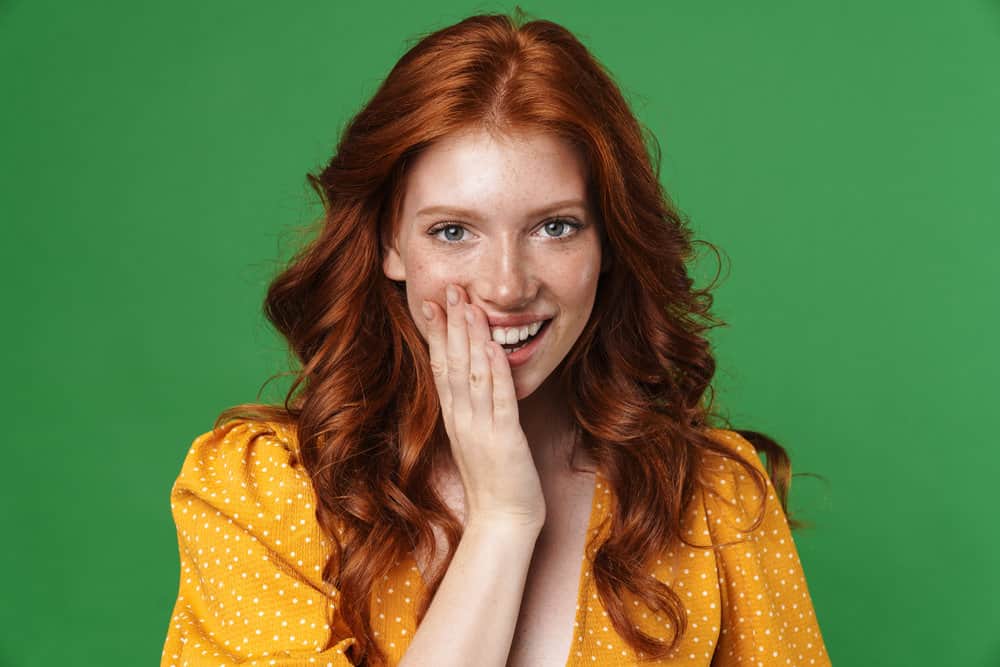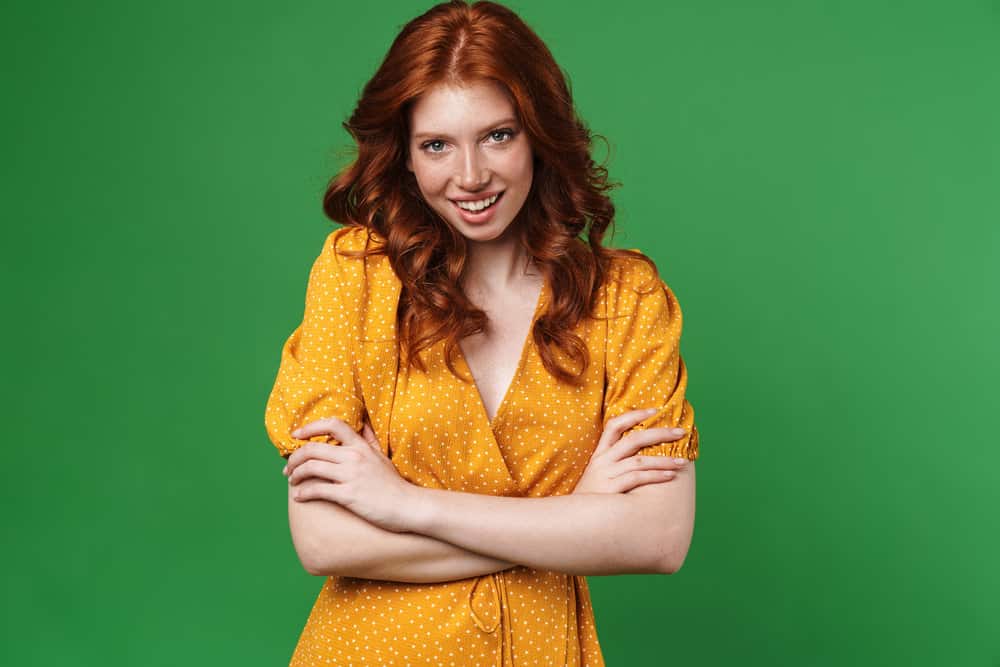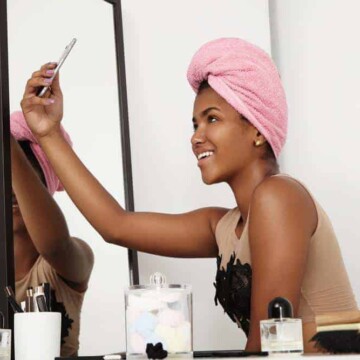
While examining your hair in the mirror, you might find that your strands have taken on a reddish appearance. The color change can be alarming, but what does it mean when your hair starts turning red?
We've got you covered if you want to find out the answers to that and more!
In this article, we’ll look at some potential reasons why your hair is turning red and give tips on what you can do to prevent and reverse it.
Table of Contents
Why Is My Hair Turning Red Naturally?
The truth is anyone’s hair color can change over time. Various factors can influence your hair color - some of them are harmless, and others are a sign that something is seriously wrong. If your hair is turning red naturally, it could be due to the following reasons: (1) you've been out in the sun too long, (2) you have hard water buildup, (3) your diet is lacking in critical nutrients, (4) its genetic, and (5) it's due to your medication.
We’ll dive into some of the most likely culprits behind your newly red locks below.
1. You’ve Been Out in the Sun
Have you spent some time out in the sun recently? Sunlight is best known for making blonde hair even blonder, but it can also reveal the hidden pigments in darker strands.
Black and brown hair usually has subtle, reddish undertones. Although the black and brown pigments usually cover these reddish hues, they can become more prominent as the sun lightens your strands.

2. You Have Hard Water Buildup
Another potential reason for your hair color change is hard water. Hard water, which contains high levels of dissolved minerals, is prevalent in American homes.
When you use hard water to wash your hair, the water coats your strands in a thin layer of minerals. Over time, this layer can build up and wreak havoc on your hair.
Hard water buildup can turn blonde hair a sickly green shade or give black or brown hair more of a reddish hue.
And since the issue is in the water, you can’t just wash the buildup away. In addition to changing your hair color, hard water can make your hair easily tangled, dry, and prone to breakage.

3. Your Diet Is Lacking in Critical Nutrients
Most people know that getting proper nutrition is necessary to get long, shiny hair. But did you know it can also affect your hair color? Hair color is determined by the amounts and types of pigments in your strand.
But if your body doesn’t have the raw materials needed to form more pigments, your locks can start to change color.
For example, Kwashiorkor is a severe type of malnutrition, where your protein levels drop critically low. And if left untreated, Kwashiorkor can turn both your hair and skin a reddish, rusty color.
Protein deficiencies are uncommon in the West, but they’re more common among:
- Vegans
- Vegetarians
- People over the age of 70
- People with digestive issues

4. It’s Genetic
One of the most common reasons people's hair turns red is genetics. Genes act like instruction manuals and inform your body of when and how to produce pigments, the protein that makes up hair, and hormones.
Genes can turn off and on as a response to things in your environment or changes in your health. If the genes that determine your hair color turn off, you may start to see a difference.
There are a number of different reasons why your hair color changes on a genetic level, including aging, stress, and hormonal changes like pregnancy, puberty, or menopause.
5. It’s Your Medication
Does your change in hair color coincide with a new medication? Although it's uncommon, certain medications and drug treatments have been shown to change the look and feel of your hair.
Some medicines can make your hair thin or alter your curl pattern, while others can change your hair from black or brown to red.

How to Prevent Your Hair From Turning Red
Now you know what causes your hair to turn red. So, you’re probably wondering if there’s anything you can do to prevent your hair from turning red. If that’s the case, this is the section for you!
Here are some of our favorite ways to keep your natural hair color around.
Get a Showerhead Filter
If you think hard water is causing your change in hair color, you have two options. You can either get to the root cause of the hard water or treat the mineral buildup itself.
You’ll have to install a shower head filter to treat the hard water at its source.
Shower head filters remove dissolved minerals before they ever get a chance to reach your strands. You can also add a monthly or bimonthly clarifying shampoo session to your hair care regimen.
Clarifying shampoos have high concentrations of cleansing ingredients and can cut through stubborn hard water buildup that ordinary shampoos leave behind.

Eat a Well-Balanced Diet
Hair growth starts internally, so you’ll need to ensure your body has everything it needs to support healthy hair. That includes drinking plenty of water and eating things like seeds, nuts, proteins, fresh fruits, and veggies.
The emphasis should be on whole, high-quality foods rather than fat and sugar-laden processed grub. In addition to preventing your color from changing, a well-balanced diet keeps your hair long, strong, and absolutely gorgeous!
Protect Your Strands From the Sun
If you love spending time outdoors, sun protection is a necessity. While most people slather on some sunscreen, they forget to protect their strands. One of the easiest ways to do this is to throw on a hat or scarf to block the sun's rays.
You can also pull your hair into a protective hairstyle, like a bun, braids, or twists.
These styles keep your strands tightly wound together, so fewer of them are exposed to the sun’s bleaching rays. And if the options that we’ve suggested don’t fit with your personal style, you can always apply a hair-friendly sunblock to your strands.
Like regular sunblock, these products contain potent ingredients that block out harmful UV rays.

How to Get Your Natural Hair Color Back
Although following the tips we’ve gone over in the previous section will help stop your strands from getting progressively redder, it may take time for your hair to return to its normal shade.
Here are a few different ways that can help you get your natural hair color back in the meantime.
Dye Your Hair
Dyeing your hair is undeniably the fastest and most effective way to get your natural hair color back. Even if you make the necessary changes to your diet and hair care routine, there’s no guarantee that your hair will return to its usual shade.
This is because hair is dead once it emerges from your scalp.
Unlike your skin, hair has no way to repair itself and grow back the lost pigments. So, you can either cut the red hair off and wait for your hair to grow back or head to a salon.
Just make sure you bring your stylist a few pictures so they can match your natural shade perfectly. You should also inform them of your recent color change, so they can ensure that your hair is healthy enough for the color service.

Reach Out to a Medical Professional
Sometimes, color-changing hair is a symptom of an untreated medical issue. If left untreated, there’s a chance that your symptoms will worsen.
A sudden, unexplainable hair color change is abnormal, so don’t hesitate to reach out to a medical professional. This is particularly important if the change in hair color is accompanied by symptoms like pain, exhaustion, or skin problems.
There are a variety of reasons why your hair is turning red. Many are relatively harmless, but others can be a sign of a major underlying condition.
So, try to identify the root cause of your red locks, so you can address the issue before it gets worse. We hope that the information we’ve gone over in this article has shown you how to do just that!




